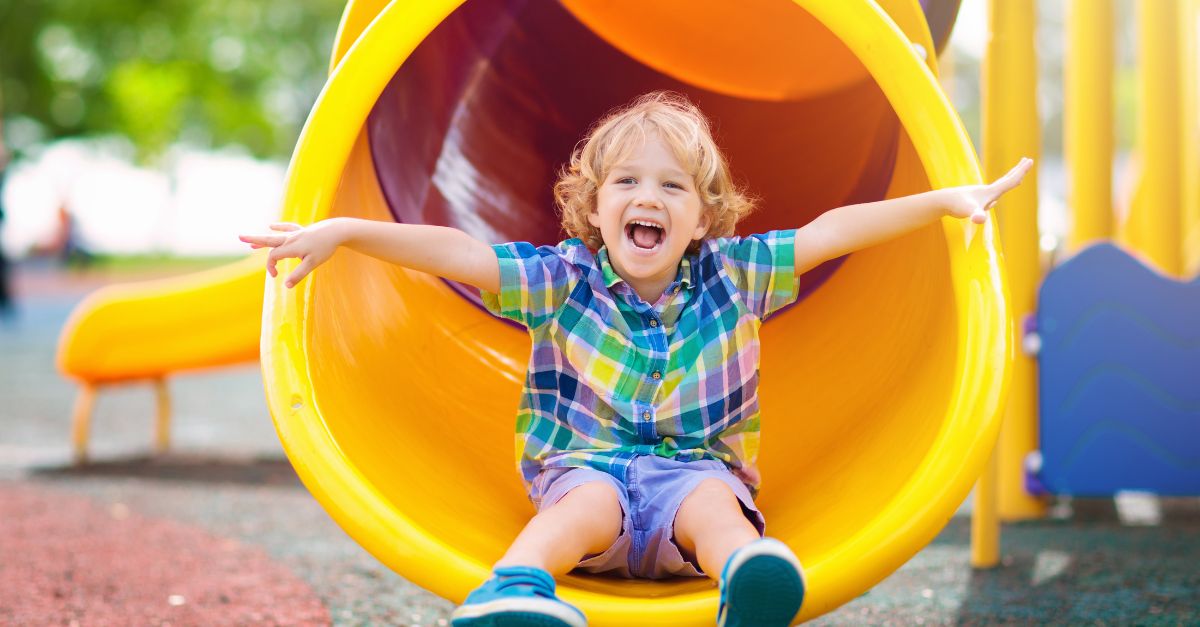5 Potty Training Myths
So, you’ve finally figured out how to get your kid to sleep through the night, and teething is somewhat over. Now you get to take a deep breath and crack open that bottle of red…wait, is that poop on the floor? And just like that, the next phase of development begins…potty training.
(Long dramatic pause while you cry in fetal position)
Honestly though, it doesn’t have to be as daunting as everyone says. If you just lower your expectations and understand that you’ll rarely see a 9-year-old walking around in diapers, then you’ll be just fine. There are so many ways to go about potty training that work for some and may not work for others. I am not here to tell you THE way. I have four kids of my own who all went about this differently, so there is no one right way.
You might be asking yourself:
- Do I let my child run around naked all weekend and see how it goes?
- Do I make my child sit on the potty every 30 minutes?
- Do I reward every time they try?
I’m not here to answer these questions. What I AM here to do is squash some myths that parents have been buying into for years and help you get set up for success.
Myth #1: My child should start potty training as soon as he turns 2
Listen, just because Karen next door had her child in underwear at 10 months old does NOT mean that your 2-year-old is behind.
Every child is different. It depends on the temperament, birth order, and motivation. No one is saying you HAVE to begin this process as soon as they blow out their 2-year-old candle. And honestly, starting before 2 years old isn’t developmentally appropriate anyway.
Take the pressure off. No one hands you a trophy for training your child early. Instead, look for signs of readiness. Some signs that show your child MAY be ready to start the process of potty training are:
- Waking up dry after naps
- Telling you when they are soiled
- Asking to be changed
- Watching you use the toilet (ugh, when will we ever pee alone?)
- Trying to pull the diaper off
When these signs are consistently shown, then you may want to start the process. Now, don’t be fooled- just because your 18-month-old sat on the little potty and peed on it does NOT mean she is ready. This happens from time to time and most parents get so excited and think it’s time to start training. But most times, they are not ready to do this consistently. And. That. Is. Okay.
Myth #2: Pull-ups will not help my child potty train
Many parents think you must go straight to underwear and skip the training pants because they won’t be able to feel when they are wet.
Don’t believe that! It all depends on the child, but pull-ups really will make your life a little less messy and a whole lot easier! Are some parents successful with just skipping pull-ups all together? Sure. But this only works if you have the time and extra clothes on hand to change them and clean up.
If you are traveling or going out for extended periods of time, a pull-up can be a life saver. Since every child is different, they might not need this step, but most kids will benefit from having the help of training pants or pull-ups until the skill is mastered. My general rule is that once a child is dry in their pull-up for 3 days straight, then we try underwear.
Myth #3: My child’s daycare will potty train him
While it is a team effort, you as the parent must initiate. Once you see signs of readiness, talk with your child’s teacher. Don’t just send your child in underwear “cold turkey” without warning the teachers. That is the worst thing you can do! Just because your child peed in the potty one time on a Saturday does not mean you should send her to school in underwear and donate every diaper you own.
Work together to devise a plan and mimic at home what happens at school. Communication is key and teaming up with your child’s teacher is vital. If your child’s teacher says he is waking up from nap dry and has been interested in sitting on the potty, then start on the weekend to try. Switch to pull-ups (buy the ones that can reattach one the sides!) and communicate with the teacher that you’re starting the process at home. A great school will work with you to mimic what you’re doing at home, but you cannot expect them to accommodate constant accidents and stop what they are doing every 30 minutes to have them try to sit. Your child’s teacher will have insight as to whether he is ready, so trust her!
If the school does not have bathrooms in the classroom, then your child will need to be able to verbalize that she has to go. To help prepare your child for this, it’s best to have him practice letting you know when he has to go at home so that he tells his teacher at school, too. In this situation, it’s best to be even-tempered in your approach to potty training. Don’t be so laid back that the school feels like your child isn’t progressing. But don’t be so over-the-top rigid that you expect the school to accommodate your military-style of potty training.
Myth #4: It will only take two days to potty train my child
Every child is different. For some, it takes a few days while for others, it may take a few weeks or even months. Don’t give up, don’t lose heart. The biggest thing to know is you should wait until you know he is truly ready before starting the process.
Be consistent but don’t shame your child for accidents. It just depends on the child’s temperament. My daughter practically potty trained herself, and she is 18 months younger than her older brother who was still in pull-ups refusing to go on the potty. She would see me trying every method to get him to go (he was pushing 4 years old at this point), and she would walk right into the bathroom, pull her diaper off and go. She’s competitive by nature, super stubborn, and likes to be in control. So, she took matters into her own hands and potty-trained herself since she saw me so focused on her older brother mastering it.
My other three were much slower in the process. Sometimes stickers worked, sometimes candy worked. One of them mastered it over a long weekend while my youngest son took the whole summer. And guess what? That’s okay! Because every child is unique and will eventually figure it out. The most important thing is to be consistent in whichever approach works best for you and to never shame your child into feeling bad for an accident.
Myth #5: It will be a blissful bonding time for my child and me
Nope, not a chance. Most likely, there will be tons of accidents and you will need to extend a lot of grace!
Want to know what makes me feel better about this? Knowing that celebrity moms like Beyoncé have to deal with poopy accidents just like me!
Laugh a lot, expect the worst, and hope for the best! Again, never scold or punish for being wet or soiled. Take your time with this and allow for it to happen naturally. You will be able to tell if your child is ready developmentally and being a little lazy OR if they are just not ready yet.
NOTE: if your child has special needs, then there is a good chance that this will come later than what is usually expected for your child’s age. Ask your child’s therapists and paediatrician what the best approach is.
Internationally known child psychologist, Kevin Leman, says, “If parents overplay simple things in life, like eating, sleeping, and potty training, they’re going to end up with a power struggle with kids.” He recommends that you not overreact when they do go or when they do not go. Going potty is a natural part of life that will come when they are ready.
The bottom line in all of this is that you are not alone in this tiring process of toilet training. It’s not for the faint of heart, that’s for sure! Just pick the best technique that works for you, extend lots of grace to your child and to you, and remember there is a light at the end of the tunnel! There is hope! It most often does not happen overnight, so create more realistic expectations and try not to get caught up in the comparison game. Just because Karen’s kid had it figured out right away doesn’t mean there is anything wrong with yours. Enjoy the slowness of the process and take the pressure off.
Missy is a professor in the early childhood department at Eastern University and director of Victory Early Learning Academy, a childcare center that she started ten years ago. Prior to that, she taught Kindergarten and second grade for a total of 10 years. She has been married to her best friend, Jason, for 18 years, and together they have four beautiful children ages 8, 9, 12 and 13 in the suburbs of Philadelphia, PA. In her spare time, Missy loves to bake, read historical fiction, sing karaoke and travel to Central America on short term missions.
More by Missy
Missy Knechel
February 14th, 2020
7 mins
Related Articles

Preparing your Childcare Summer Camp Program
April 16th, 2025 | Maddie Hutchison
